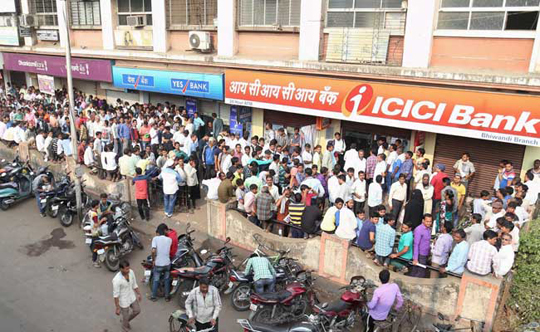New Delhi, Nov 17: Government today lowered the exchange limit for now-defunct 500 and 1,000 rupee notes to Rs 2,000 from the existing cap of Rs 4,500, effective tomorrow.

Among other measures, it has allowed up to Rs 2.5 lakh cash withdrawal from bank account of a bride or groom or their parents for a marriage during the ongoing wedding season.
"To enable larger number of people to get benefit of over-the-counter exchange of Rs 500 and Rs 1,000 notes, the existing limit of Rs 4,500 will be reduced to Rs 2,000 with effect from tomorrow," Economic Affairs Secretary Shaktikanta Das told reporters.
The over-the-counter exchange of Rs 500/1,000 in return of new currency will be available "once per person till December 30".
"This will enable larger number of people to exchange notes. There is no cash shortage and enough cash is available," he said.
The decision comes a day after the government directed banks to put indelible ink mark on the right index finger of persons to screen them from using the exchange facility more than once.
Prime Minister Narendra Modi had on November 8 demonetised Rs 500 and Rs 1,000 notes in his bigger war against black money, terror financing and counterfeit notes.
Since then a lot of representations have come to Prime Minister and Finance Minister to ease withdrawal norms for wedding purposes.
"This has been considered by the government and decided that for wedding ceremonies, up to Rs 2.5 lakh will be allowed to be withdrawn from account if father or mother or the bride and groom," Das said.
He said the account has to be KYC compliant and self declaration has to be given to the bank. The Rs 2.5 lakh can be withdrawn from only one account.




Comments
One guy is mentioning Reddys marriage and fyi ... It is his money and IT deparatment has clear idea about it and they will ask him to make payment ,if there is any discprepancy ...as per him .. everything was prepaid and planned long back ... when muslim dominated congress was in power sahara chief arranged lavish wedding , mulayam did even more lavish wedding ... adara bagge this khan grace thirbokis dont comment .
saleem , if you cannot pay for autowala , use public transport .. who cares ..
george , 2.5 lakhs in cash . now caterers , shops , hall accept online transfers or via cheque now and gold business also accepts cheque ..use cash for other expenses ... cmon yaar common man can easily make wedding with just 2.5 lakhgs ...if u want to spend more and if u dont have cheque and account .. it is really then u r a black money hoarded and believed in parallel banking system ... yaarge bidthiya guru ... one particular segment can accept ur vesrion ashte .
Mohammed , hahaha ... u might be tax payer ... but all over india tax payers no is just 1.3 crores .. out of 130 crore ... spread this message in your group ... no body cares ... we support our regime and there are crores of people backing it ... why dont u ask ur community members to open account and withdraw money via atm ... and moreover here people get bitti bhagyas ..simple for the sake of hating we should not hate ...
Porkis frustration can be clearly understood :) hahaha ... bholo bharath mata ki jai ... vande mataram ... hara hara modi jai jai modi ...
Modiji, poor are suffering....you said in the Goa riches will be suffering but in fact it is other way around....please fix it as soon as possible before its gets in to problem....
Y are we applied indelible ink on our fingers?
Are we not tax payers?
We go to bank for our money earned by us,
We must strongly oppose this move
If you all agree, spread this message to all
Fenku ye kya kar diya.. Gareebon ki badduwa khali nahi jayegi.. Abki baar No fenku sarkar.
Add new comment